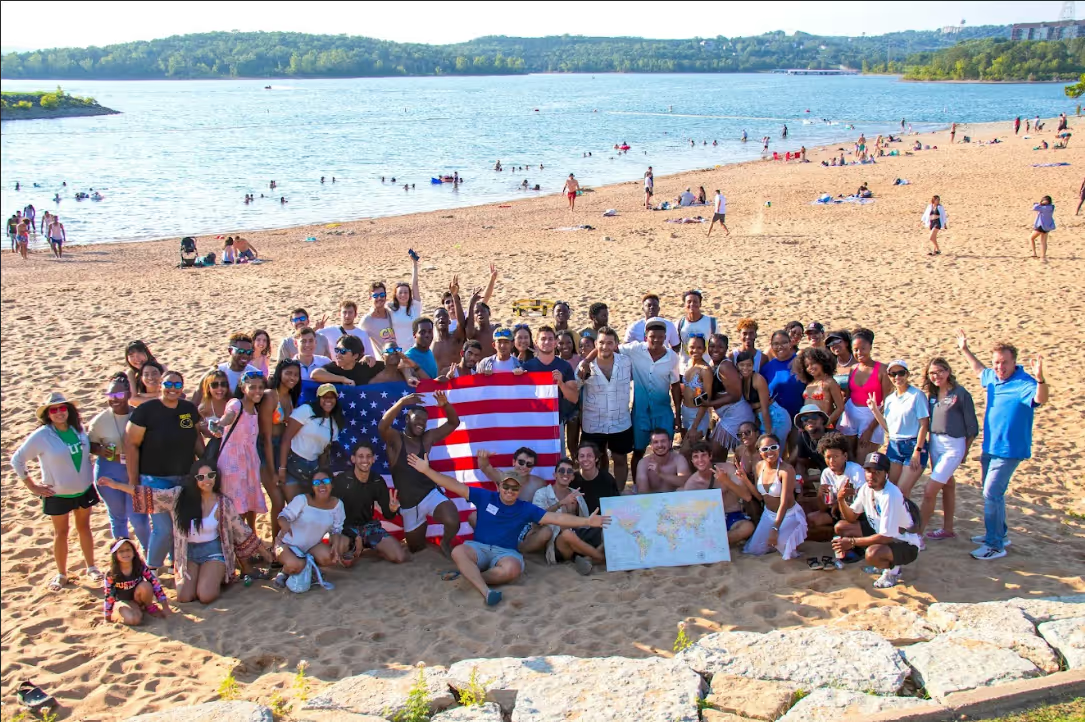
Summer Work Travel Students in Branson, Missouri, Support Local Economy, Gain Insight into U.S. Life and Culture
Cenet recently had the opportunity to sit down with Jonas Tavares, Director of Workforce Development for the Taney County Partnership in Branson, Missouri. In our conversation, Jonas shared his insights on how the Summer Work Travel (SWT) Program has shaped the Branson community and other tourist destinations across the U.S. From strengthening the local workforce to fostering cultural exchange, he revealed the program’s far-reaching impact on businesses, residents, and international students alike.
Each summer, the small town of Branson, Missouri (population 13,000), transforms into one of the busiest destinations in the nation. Over 8 million visitors flock to Branson every year, drawn by its vibrant live entertainment, thrilling amusement parks, scenic Ozark landscapes, and a wide variety of dining and shopping options.
Heck, last summer the Rolling Stones performed in Ridgedale, part of the Branson/Lakes Area – and the Stones don’t usually stop in small towns.
Simply put, Branson has become an economic engine for southwest Missouri.
Branson annually faces the same challenge: how does a town of 13,000 staff-up to meet its seasonal needs?
One solution is the Department of State’s Summer Work Travel (SWT) Program. SWT is the largest U.S. government exchange program and the second largest in the world (the European Union’s ERASMUS Program is #1).
Through SWT, approximately 700 university students from around the world come to Branson each year to work summer jobs, such as ride operators, waiters, and lifeguards. Their participation plays a critical role in helping Branson businesses operate at full capacity during the busy summer months.
Jonas Tavares, Director of Workforce Development for the Taney County Partnership in Branson, told us that, “Branson’s summer season would be difficult to manage without the support of SWT students.
“The students are having a cultural adventure,” he continued. “They are curious about America, anxious to soak up everything in their experience, and our visitors are often delighted to discover they are being served by a student from the Dominican Republic, Turkey, or Thailand.”
The Summer Work Travel Program receives no funding from the U.S. Government. Students pay a program fee up front and use their earnings to cover their travel and living expenses. Plus, students enjoy their time in the U.S. – a recent survey showed that 96.1% of program alumni recommend SWT to family members and friends.
Because SWT students constitute a vital seasonal workforce for Branson, Tavares said that the community has devised a number of ways to support the students while they are in town. "These SWT students are really a gift to Branson,” Tavares said. “So as a community, we decided we needed to support them. We want them to be happy and to have a great American experience with us. And we want them to tell their friends back home.”
According to Tavares, the importance of the SWT Program to Branson’s economy and to the entire state of Missouri led the Branson/Lakes Area Chamber of Commerce and Taney County Partnership to launch the Branson BridgeUSA Community Support Group (CSG) in 2015. Thanks to the CSG, each international student who comes to Branson is met with a promise of care and support from the community. Area businesses, churches, and employers are all involved in the support group’s work.
Over the past decade, the CSG has helped thousands of SWT participants navigate Branson and their day-to-day lives during their programs by providing orientations, ensuring that local resources such as housing and transportation are accessible and well understood by the visiting students, and organizing cultural exchange activities for the students throughout the summer.
The CSG also has become more involved in educating Branson citizens and host businesses about the SWT Program, empowering local non-profits and churches as resources, and engaging local law enforcement to conduct presentations on safety issues for the participants while welcoming them to the community.
In the summer of 2024, the CSG provided 6 welcome orientations, organized 7 cultural activities, and arranged 2 volunteer opportunities for the international visitors to give back to the Branson community. Moreover, the CSG matched 215 visiting students with local families, who welcomed them with true Ozark hospitality – opening their homes, sharing meals, and making them feel like part of the community.
Prior to summer 2024, members of the CSG designed an online, volunteer-based ride share app. This app helped provide an estimated 1,500 free rides to participants as a service to help them travel to and from work, stores, and cultural activities in the community during the summer.
These are just a few of the organized programs that the CSG facilitated in 2024, according to Tavares. Throughout the summer, host businesses, housing facilities, churches, and various community organizations contribute in meaningful ways to support exchange participants. Their collective efforts aim to ensure that each student has a positive and enriching experience in Branson – one that reflects the warmth and care of the community and helps shape their understanding of American culture and life.
Each year, nearly 100,000 young, future leaders arrive in the United States, many for the first time, through the Summer Work Travel Program. Across the country, individuals like Tavares and communities like Branson welcome these students, offering vital support and leaving them with a lasting, positive impression of our nation and its people. In return, the students help fill essential seasonal roles, supporting the economies of tourism-driven destinations like Branson.
This program not only strengthens local economies but also fosters global friendships and deeper community ties – contributing to a safer, more connected world.
And remarkably, it does all of this without requiring a single dollar in government spending.

.avif)

